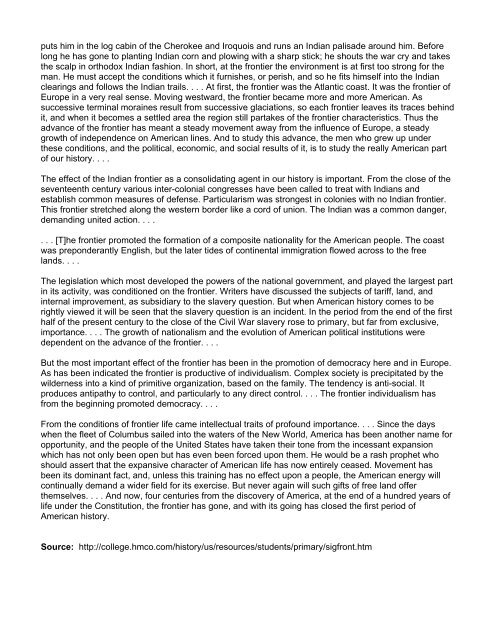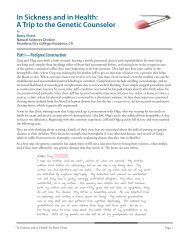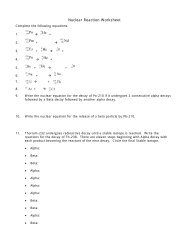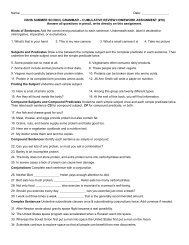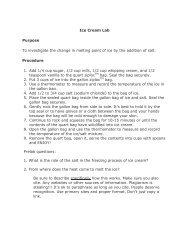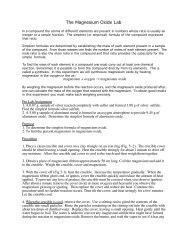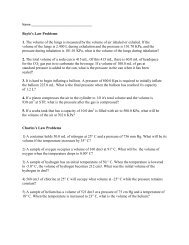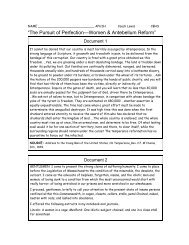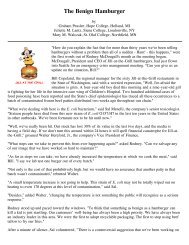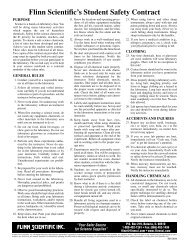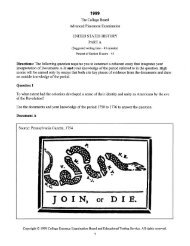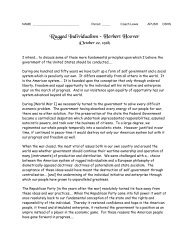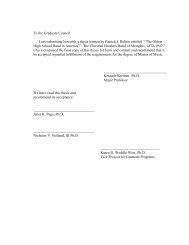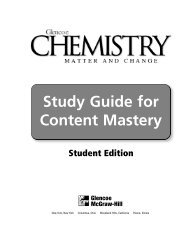Frederick Jackson Turner's "Frontier Thesis."
Frederick Jackson Turner's "Frontier Thesis."
Frederick Jackson Turner's "Frontier Thesis."
- No tags were found...
You also want an ePaper? Increase the reach of your titles
YUMPU automatically turns print PDFs into web optimized ePapers that Google loves.
puts him in the log cabin of the Cherokee and Iroquois and runs an Indian palisade around him. Beforelong he has gone to planting Indian corn and plowing with a sharp stick; he shouts the war cry and takesthe scalp in orthodox Indian fashion. In short, at the frontier the environment is at first too strong for theman. He must accept the conditions which it furnishes, or perish, and so he fits himself into the Indianclearings and follows the Indian trails. . . . At first, the frontier was the Atlantic coast. It was the frontier ofEurope in a very real sense. Moving westward, the frontier became more and more American. Assuccessive terminal moraines result from successive glaciations, so each frontier leaves its traces behindit, and when it becomes a settled area the region still partakes of the frontier characteristics. Thus theadvance of the frontier has meant a steady movement away from the influence of Europe, a steadygrowth of independence on American lines. And to study this advance, the men who grew up underthese conditions, and the political, economic, and social results of it, is to study the really American partof our history. . . .The effect of the Indian frontier as a consolidating agent in our history is important. From the close of theseventeenth century various inter-colonial congresses have been called to treat with Indians andestablish common measures of defense. Particularism was strongest in colonies with no Indian frontier.This frontier stretched along the western border like a cord of union. The Indian was a common danger,demanding united action. . . .. . . [T]he frontier promoted the formation of a composite nationality for the American people. The coastwas preponderantly English, but the later tides of continental immigration flowed across to the freelands. . . .The legislation which most developed the powers of the national government, and played the largest partin its activity, was conditioned on the frontier. Writers have discussed the subjects of tariff, land, andinternal improvement, as subsidiary to the slavery question. But when American history comes to berightly viewed it will be seen that the slavery question is an incident. In the period from the end of the firsthalf of the present century to the close of the Civil War slavery rose to primary, but far from exclusive,importance. . . . The growth of nationalism and the evolution of American political institutions weredependent on the advance of the frontier. . . .But the most important effect of the frontier has been in the promotion of democracy here and in Europe.As has been indicated the frontier is productive of individualism. Complex society is precipitated by thewilderness into a kind of primitive organization, based on the family. The tendency is anti-social. Itproduces antipathy to control, and particularly to any direct control. . . . The frontier individualism hasfrom the beginning promoted democracy. . . .From the conditions of frontier life came intellectual traits of profound importance. . . . Since the dayswhen the fleet of Columbus sailed into the waters of the New World, America has been another name foropportunity, and the people of the United States have taken their tone from the incessant expansionwhich has not only been open but has even been forced upon them. He would be a rash prophet whoshould assert that the expansive character of American life has now entirely ceased. Movement hasbeen its dominant fact, and, unless this training has no effect upon a people, the American energy willcontinually demand a wider field for its exercise. But never again will such gifts of free land offerthemselves. . . . And now, four centuries from the discovery of America, at the end of a hundred years oflife under the Constitution, the frontier has gone, and with its going has closed the first period ofAmerican history.Source: http://college.hmco.com/history/us/resources/students/primary/sigfront.htm


